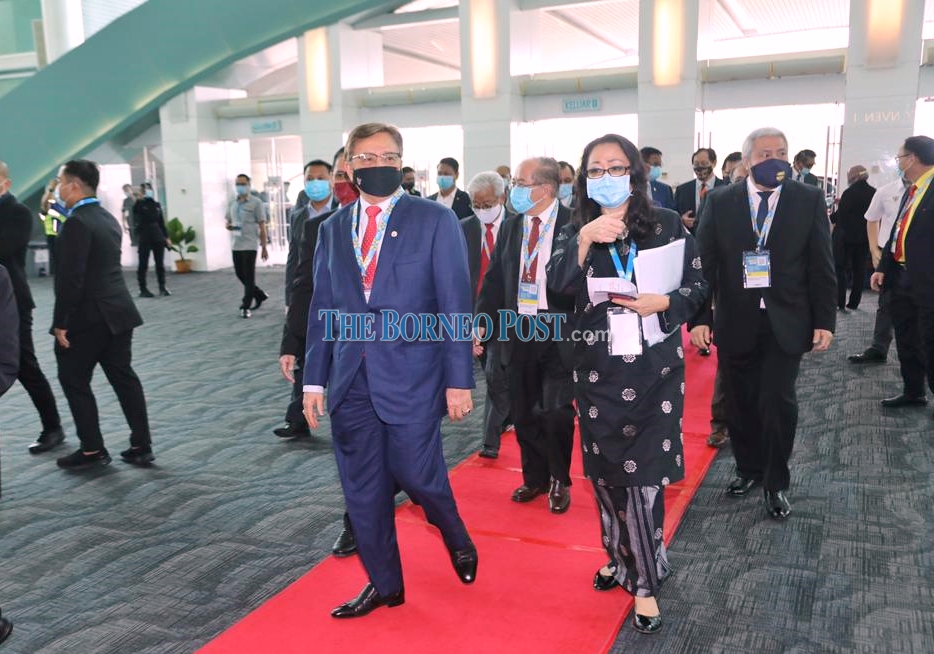
Abang Johari is ushered by Deputy State Secretary and IDECS chairperson Datu Dr Sabariah Putit (second right). Also seen are Deputy Chief Ministers Datuk Amar Awang Tengah Ali Hasan (right), Datuk Amar Douglas Uggah Embas (third right) and Tan Sri Datuk Amar Dr James Jemut Masing (fourth right). Photo by Chimon Upon
KUCHING (Oct 7): Sarawak is fortunate to have embarked on a digital transformation journey in 2017 as it has prepared the state to address various issues and challenges faced during the Covid-19 pandemic, said Chief Minister Datuk Patinggi Abang Johari Tun Openg.
“Today, we face one of the significant global challenges of our generation. The Covid-19 pandemic has, without a doubt, caused severe economic and social impacts which has affected our social interactions and people’s livelihoods.
“However, we are fortunate that we have embarked on a digital transformation journey in 2017 as part of our Sarawak Digital Economy Strategy (2018-2022) and thankfully are able to manage the devastating impact of Covid-19 in our daily lives and interactions,” he said at the 4th International Digital Economy Conference Sarawak (IDECS) 2020 at the Borneo Convention Centre Kuching (BCCK) here today.
He said the Sarawak Digital Economy Strategy (2018-2022) saw progress in digitalising the state’s economy and was also put to the test, successfully addressing most of the issues raised by the Covid-19 pandemic.
“As always with any strategy, certain aspects such as digital sovereignty, interoperability, ease of doing business, cybersecurity, digital readiness and supporting digital transformation of the private sector could be further strengthened to accelerate our post Covid-19 Economic Agenda,” he added.
He also said the state’s digital readiness was recently highlighted when the Sarawak Disaster Management Committee (SDMC) was awarded the Malaysian Technology Excellence Award by the Singapore Business Review for utilising digital technology to control the spread of Covid-19 in Sarawak.
Nevertheless, Abang Johari acknowledged that Covid-19 will have permanent, long-term effects on how economies and financial systems operate in the future.
“We are no longer able to do ‘business as usual.’
“Advancing into the future, Sarawak needs to enhance its productivity to remain competitive and at the same time, create a clean, healthy and resilient environment that will last for generations,” he said.
He said the Sarawak Economic Action Council (SEAC) was established in May this year to formulate the state government’s post Covid-19 Exit Economic Strategy 2030.
“One of SEAC’s strategies was to identify a number of catalytic initiatives that will propel Sarawak’s economic growth to 8 per cent annually, thus achieving Sarawak’s 2030 vision.
“These initiatives have gone through an intensive prioritisation process that was anchored on six key principles namely improved economic structure and environment; ease of doing business; targeted spending; asset optimisation and funding; digital government; and social and economic inclusivity,” he said.
